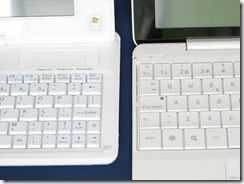 In terms of mobile productivity, I’m sorry to have to report that the Compaq Airlife 100 has a lot of holes. It does, however, prove that there’s a lot of potential in the ‘smart’ platforms. Long battery life (due to extremely low idle drain) and always-on/connected are features that, once you’ve experienced them, are hard to let go of. Android has potential too but there are 2 key things that need to be done. 1) The browser needs to be improved. The Airlife 100 is not up to doing any web-application work. 2) The marketplace needs to be put into place so that developers have a channel for productive and large-screen apps. Once these two issues are fixed though, it’s only a matter of time before productive mobile computing moves to ‘smart’ platforms with advanced mobile operating systems.
In terms of mobile productivity, I’m sorry to have to report that the Compaq Airlife 100 has a lot of holes. It does, however, prove that there’s a lot of potential in the ‘smart’ platforms. Long battery life (due to extremely low idle drain) and always-on/connected are features that, once you’ve experienced them, are hard to let go of. Android has potential too but there are 2 key things that need to be done. 1) The browser needs to be improved. The Airlife 100 is not up to doing any web-application work. 2) The marketplace needs to be put into place so that developers have a channel for productive and large-screen apps. Once these two issues are fixed though, it’s only a matter of time before productive mobile computing moves to ‘smart’ platforms with advanced mobile operating systems.
Do you agree?
As a consumer device, the Airlife is also missing a few features. Better media support and management is badly needed for a start so with the costs running close to that of the iPad, I suspect the latter would be a better choice.
Great progress by HP and signs of real promise mean that smart books have a future for mobile computing / mobile productivity but it could be 2011 before we se a real netbook competitor.











New article: Compaq Airlife 100 Review at Carrypad http://bit.ly/cQue5t
Compaq Airlife 100 Review at Carrypad: In terms of mobile productivity, I’m sorry to have to report that the Comp… http://bit.ly/dcf14u
as long as i cannot use my full blown office, business and scientific applications these devices are no substitute for any netbook pda/smartphone combo.
I agree: these devices are no substitute to full Windows environment such as netbooks or even clamshells.
Yeah but I don’t think they are TRYING to substitute for a windows machine. Different target market. e.g. bet your mum does not need “full blown office, business and scientific applications” when mobile, even if you do.
she doesn’t even need a continuous connection to the net ….. an original small netbook with a clean desktop and about 5 icons was sufficient for her: browser, email, skype, wordpad, pdf reader and mediaplayer
and to know how to put her system to sleep instead of always powering down.
BUT what was important was to COMPATIBLE 1:1 with full blown windows systems and their applications without any additional gimmicks like cloud, web 2.xxx connectivity and conversions tricks and that sort of stuff people like to sell everybody as big advantages nowadways.
@animatio, why was windows compatibility important, exactly?
ugh, never mind, commenting from the hip fails again.
Too bad it doesn’t have a fully articulated screen… I’d like to have more choice of ARM based netbooks, as those CPU are powerful enough my needs.
Anyway I would install my usual linux distribution & tools instead of using android, so software lacks is not a problem (except on the driver side).